
The UK Independence Party is a Eurosceptic, right-wing populist political party in the United Kingdom. The party reached its greatest level of success in the mid-2010s, when it gained two members of Parliament and was the largest party representing the UK in the European Parliament. The party is currently led by Neil Hamilton.
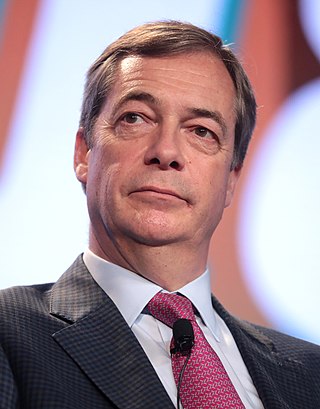
Nigel Paul Farage is a British broadcaster and former politician who was Leader of the UK Independence Party (UKIP) from 2006 to 2009 and 2010 to 2016 and Leader of the Brexit Party from 2019 to 2021. He served as Member of the European Parliament (MEP) for South East England from 1999 until the United Kingdom's exit from the European Union in 2020. He was the host of The Nigel Farage Show, a radio phone-in on the Global-owned talk radio station LBC, from 2017 to 2020. Farage is currently the Honorary President of Reform UK and a presenter for GB News.
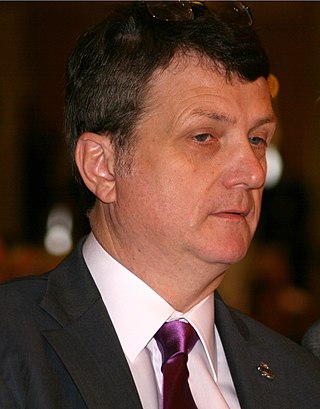
Gerard Joseph Batten is a British politician who served as the Leader of the UK Independence Party (UKIP) from 2018 to 2019. He was a founding member of the party in 1993, and served as a Member of the European Parliament (MEP) for London from 2004 to 2019.

David Campbell Bannerman is a British Conservative Party politician who served as Member of the European Parliament (MEP) for the East of England from 2009 to 2019. He is currently Chairman of The Freedom Association. He served as Deputy Leader of UK Independence Party (UKIP) from 2006 until 2010, when he was replaced by Paul Nuttall.
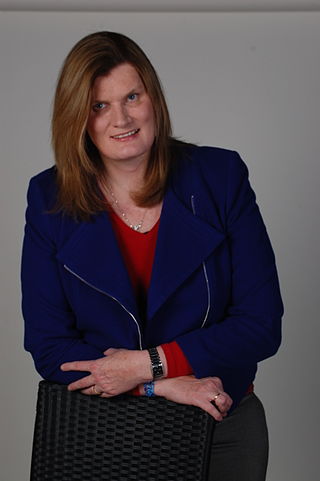
Nicole Sinclaire is a British politician and former leader of the We Demand a Referendum Party who served as a Member of the European Parliament for the West Midlands from 2009 to 2014.
The UK Independence Party (UKIP) held a leadership election in September 2006.

The UK Independence Party (UKIP) held a leadership election in 2009, with ballots closing on 26 November. The election was won by Malcolm Pearson, Baron Pearson of Rannoch.

The 2014 European Parliament election was the United Kingdom's component of the 2014 European Parliament election, held on Thursday 22 May 2014, coinciding with the 2014 local elections in England and Northern Ireland. In total, 73 Members of the European Parliament were elected from the United Kingdom using proportional representation. England, Scotland and Wales use a closed-list party list system of PR, while Northern Ireland used the single transferable vote (STV).
Margaret Lucille Jeanne Parker is an English politician who served as a Member of the European Parliament (MEP) for the East Midlands region between 2014 and 2019. She was born in Grantham and educated at Kesteven and Grantham Girls' School and De Montfort University, where she read Law.

Diane Martine James is a British politician who was a Member of the European Parliament (MEP) for South East England from 2014 to 2019. She was briefly leader-elect of the UK Independence Party (UKIP) from September 2016 to October 2016, but resigned before formalising her leadership. At the time of her election to the European Parliament, James was one of three UKIP MEPs for South East England, before joining the Brexit Party in 2019.

Steven Marcus Woolfe is a British barrister, writer and commentator. He is currently the Director of the Centre for Migration & Economic Prosperity a research think tank studying population and immigration into the UK, Europe and US. He was a Member of the European Parliament (MEP) for North West England from 2014 until 2019. From 2014 he was a UKIP MEP but resigned to become an Independent MEP in October 2016 following his opposition to the party's overly negative policy on immigration. He remained Independent until July 2019. He is not a member of any political party or holds any political office.

William Milroy Etheridge is an English politician who was previously a Member of the European Parliament (MEP) for the West Midlands region. He was elected in 2014 as a UK Independence Party (UKIP) candidate, but left the party in October 2018 and joined the Libertarian Party. He joined the Brexit Party in 2019 but rejoined UKIP in September 2020.

David Adam Coburn is a Scottish politician and businessman who served as a Member of the European Parliament (MEP) for Scotland from 2014 to 2019. A former member of the UK Independence Party (UKIP), Coburn was the leader of UKIP Scotland from July 2014 until December 2018.
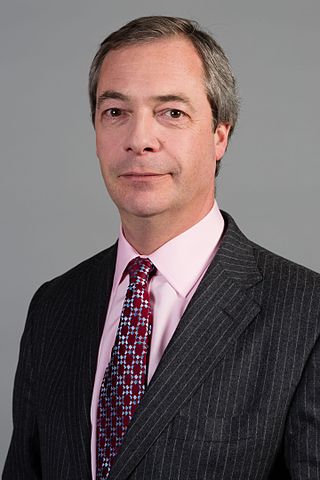
Nigel Farage is a former British MEP who has stood as a candidate representing eurosceptic parties UK Independence Party (UKIP) and The Brexit Party since 1994. He was a Member of the European Parliament representing South East England since the 1999 election, winning re-election four times. Farage has stood for election to the House of Commons seven times, in five general elections and two by-elections, but has not won any of those elections. He was also a proponent of the UK leaving the European Union in the 2016 referendum, in which the electorate voted to do so by 52% to 48%.
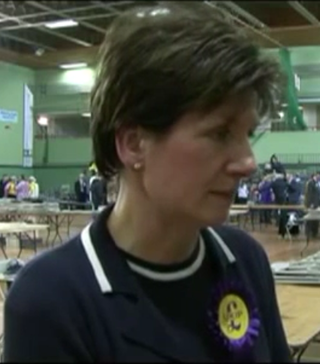
The September 2016 UK Independence Party leadership election was triggered after Nigel Farage, the leader of the UK Independence Party, announced on 4 July 2016, following the Leave result in the UK referendum on EU membership, that he would step down when a new leader had been elected.
The November 2016 UK Independence Party leadership election took place following the announcement on 4 October 2016 by Diane James, the leader-elect of the UK Independence Party, that she would not accept the leadership of the party, despite winning the leadership election 18 days earlier. Nigel Farage, whom James was to succeed after the previous leadership election following his resignation, was selected the next day to serve as interim leader.
The 2017 UK Independence Party leadership election was called following the resignation of Paul Nuttall as leader of the UK Independence Party on 9 June 2017, following the poor performance of the party in the 2017 general election. Former party chairman Steve Crowther was chosen three days later to serve as interim leader.
The 2018 UK Independence Party leadership election was triggered after members voted to remove Henry Bolton as leader of the UK Independence Party at an extraordinary general meeting held in Birmingham on 17 February 2018. It was the fourth UKIP leadership election in eighteen months. Interim leader Gerard Batten was ultimately elected unopposed as the party's new leader.

Reform UK is a right-wing populist political party in the United Kingdom. It was founded with support from Nigel Farage in November 2018 as the Brexit Party, advocating hard Euroscepticism and a no-deal Brexit, and was briefly a significant political force in 2019. After Brexit, it was renamed to Reform UK in January 2021, and became primarily an anti-lockdown party during the COVID-19 pandemic. Subsequently, in December 2022, it began campaigning on broader right-wing populist themes during the British cost-of-living crisis. Its greatest electoral success was as the Brexit Party, which won 29 seats and the largest share of the national vote in the 2019 European Parliament election.
The 2019 UK Independence Party leadership election took place following the departure on 2 June of Gerard Batten from the leadership of the UK Independence Party. The result was announced on 10 August 2019, with Richard Braine being elected to lead the party. This was the party's fifth leadership election in three years. Braine resigned just two months later, triggering a sixth leadership election.
















